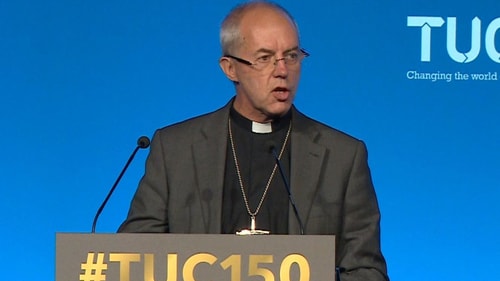The Archbishop of Canterbury knew what he was doing.
Ahead of his speech to the Trade Union’s Congress this week he put out a tweet teasing that it might ruffle a few feathers. He knew that it would reignite the debate that had hardly simmered down follow his involvement in the IPPR thinktank’s commission on economic justice and their report last week.
Justin Welby followed up his calls for an increased minimum wage and an overhaul in inheritance arrangements with an attack on gig-economy employers and zero-hours contracts. In questions following his speech he spoke about the Universal Credit scheme, saying that, “It was supposed to make it simpler and more efficient. It has not done that. It has left too many people worse off, putting them at risk of hunger, debt, rent arrears and food banks.”
The backlash has been intense. The front page of Thursday’s Times reported that ‘Tories blast Archbishop’, tweets flew swiftly and often without much theological nuance. After the IPPR report the Taxpayer’s Alliance perhaps took the wooden spoon for theological illiteracy with their comment: “The Archbishop seems to have forgotten Jesus’ command to ‘render unto Caesar what is Caesar’s, and unto God what is God’s’. He should stick to his important theological work and keep out of politics!”
The problem with the Taxpayer’s Alliance quoting from Mark 12 is that, alongside the companion passage in Matthew 22, it is where I would go for a defence of Christian engagement in politics. The Herodians and Pharisees were out to trap Jesus, they wanted him either to pledge allegiance to the Roman overlords or speak out in rebellion against them. Instead Jesus did neither; the coins with Caesar’s image on were Caesar’s property, but God’s image is spread far wider than the coinage they were discussing. When Jesus says to give to Caesar what is his and to God what is God’s, Jesus is acknowledging the role of government and, by extension, of taxation. But importantly, He is also saying that all of life, even the coin, even Caesar, everything is God’s.
The commands to stand for justice which are littered throughout the Bible – for the quartet of the vulnerable, the orphan, the widow, the immigrant and the poor, as Tim Keller puts it in Generous Justice – ensure that we cannot pretend theology isn’t political and reminds us that the activity of the church is rightly concerned with the welfare of people on earth as well as their eternal salvation. It is always both/and, not either/or.
This doesn’t give us a carte blanche to engage in politics in whatever way we choose, and I think there are a couple of questions that it is helpful to ask about Welby’s intervention. His position is unique: not only does he also occupy a seat in the House of Lords but he is also the leader of the Church of England and by virtue of the establishment of that church, the de facto Christian leader of England. That means he isn’t just any old church leader speaking out. He has a platform that is rarely afforded to others, and the use of that platform is worthy of scrutiny.
"A challenge for local church leaders when considering the Archbishop’s intervention this week is, what does this mean for me? Where should I speak up and where should I stay quiet?"
Christians in the UK tend to vote across party lines. Research from the Evangelical Alliance before the 2015 general election, suggested that Evangelicals broadly planned to vote in a similar fashion to the wider population. When a key leader is associated with organisations and platforms – the IPPR thinktank and the TUC – that are aligned with one party (in this case the Labour party) there is the risk that it sends two damaging signals.
First to the general public, the media and politicians, that Christians are predominantly to be found in that party camp. And second, to Christians, that their views have greater or less legitimacy depending whether they cohere with what that party says. Despite protestations of non-partisan political engagement, implicit signals carry strength.
A challenge for local church leaders when considering the Archbishop’s intervention this week is, what does this mean for me? Where should I speak up and where should I stay quiet?
As a rule, I think where it is encouraging political engagement, speaking up is vital, and when it is speaking for the disenfranchised and those who have the least, it is biblically commanded. All of this can be done without signalling party political support. I would be wary of platforms offered by political parties, or campaigns clearly associated with one party – they will often want the endorsement of local leaders to give their campaign legitimacy and help recruit more supporters.
Next week the media will have moved on from Welby’s intervention, but politics will always be with us. Both locally and nationally political engagement is an important outworking off our beliefs. When we engage we should focus on speaking up for the justice that God commands, for the freedom God brings, and for the truth of His word.



